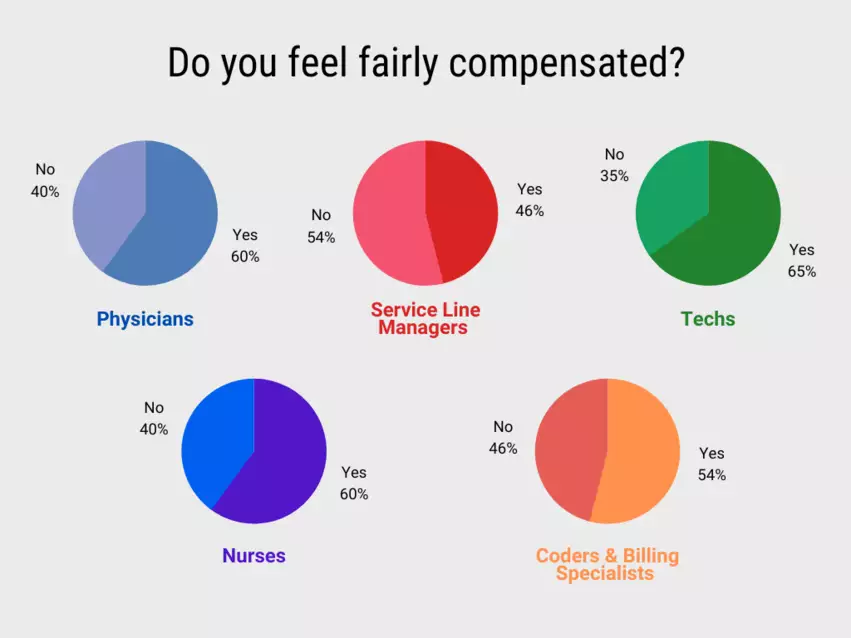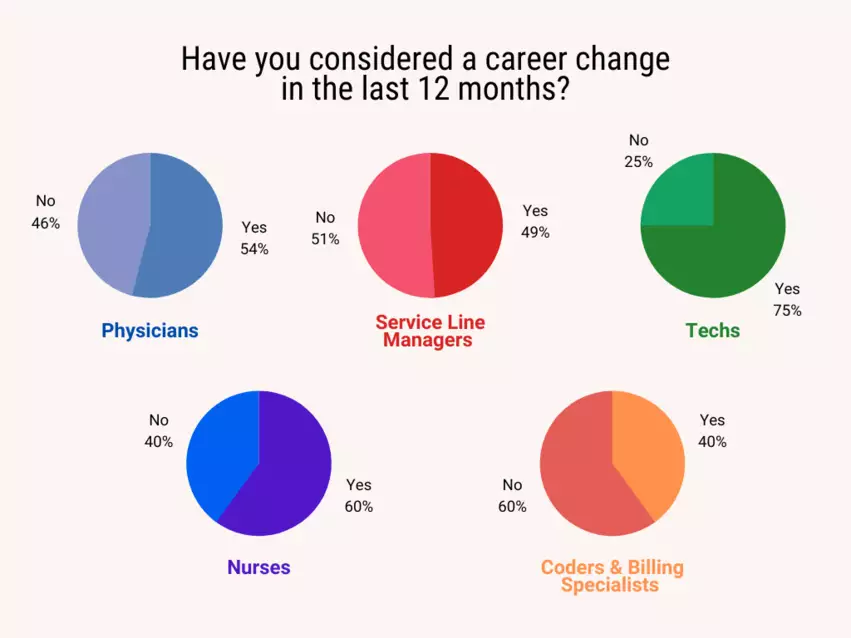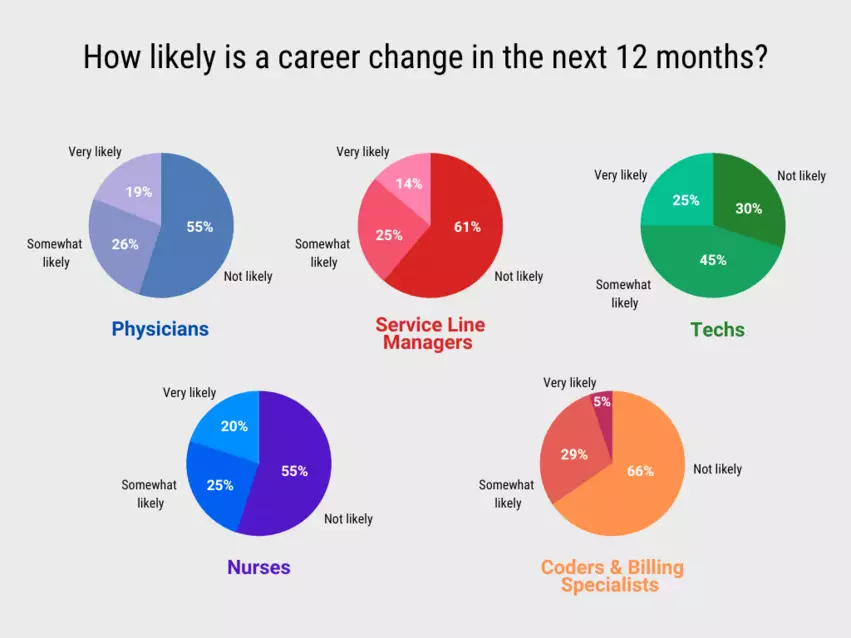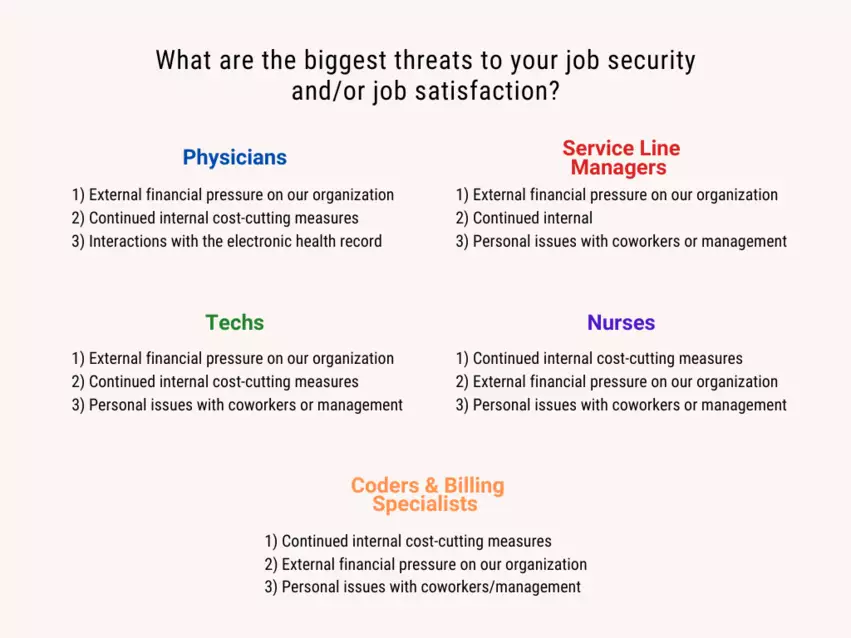Salaries and job satisfaction in cardiology: 8 takeaways from a new survey of cardiologists and their colleagues
Cardiologists are associated with one of the highest annual salaries in all of healthcare—in fact, according to one recent report, they earn more than any other job in the United States. Do those high earnings affect feelings of burnout and career satisfaction? Are other members of the heart team experiencing a similar windfall?
We aimed to answer those questions, and many others, with our 2023 Cardiovascular Business Salary and Job Satisfaction Report, an annual survey focused on asking today’s cardiologists—and many of their colleagues—to share details about their own careers.
We heard from a wide variety of cardiology professionals for this year’s report, including cardiologists, interventional cardiologists, cardiovascular service line directors, cardiac surgeons, nurses and more. To make their answers easier to digest, we separated the answers to all non-salary questions into five groups:
- Physicians: Cardiologists, interventional cardiologists and surgeons
- Service Line Managers: Vice presidents, administrators, department chiefs, service line directors and office managers
- Techs: Technicians, technologists and sonographers.
- Nurses: Nurses, nurse practitioners and physician assistants.
- Coders/Billing Specialists
These are eight key takeaways from our findings:
1. Compensation among cardiologists and other cardiology professionals
Base on the survey responses we received, U.S. cardiologists earned an average annual salary of $475,000 in 2022, up more than 9% from the $434,000 they averaged in 2021. This is even higher than the $421,330 reported by the U.S. Department of Labor.
Tom Florence, president of the physician recruiting firm Merritt Hawkins, an AMN Healthcare company, says his organization has seen the same trend in its own reporting. The average salary offer made to a cardiologist was $446,000 in 2021, but $484,000 in 2022.

“Given long-term trends, it is likely that cardiologists will remain in strong demand for the foreseeable future.”
- Tom Florence, President, Merritt Hawkins
“An increase in compensation for cardiologists was to be expected given the corresponding increase in demand for their services and for the services of a variety of other specialists,” Florence explains. “The main driver of this demand is the population aging. For the first time in history, the U.S. is on track to have more seniors aged 65 and older than children and adolescents, and seniors see a physician at three times the rate of younger people and generate a much higher proportion of tests and procedures.”
There are many other factors to consider when considering the high levels of demand in cardiology. Many cardiologists are approaching retirement, for example, leading to a significant number of jobs that need to be filled. In addition, Florence adds, the “lull in physician utilization caused by the COVID-19 pandemic” is officially over, leading to many patients who may have avoided the hospital to finally pick up the phone and make an appointment.
“Given long-term trends, it is likely that cardiologists will remain in strong demand for the foreseeable future,” he says.
In addition to cardiologists, of course, the 2023 Cardiovascular Business Salary and Job Satisfaction Report also heard from many other cardiology professionals. Average annual salaries for other job titles included:
- Cardiac surgeons: $636,000
- Interventional cardiologists: $589,000
- Department chiefs: $401,000
- Physician assistants: $204,000
- VPs/service line directors: $175,000
- Administrators: $123,000
- Nurse practitioners: $139,000
- Nurses: $95,000
- Technologists/Technicians: $87,000
- Office managers: $62,500
- Sonographers: $60,000
- Coders/billing specialists: $56,000
2. How salaries in cardiology have changed in recent months
The pandemic caused some hospitals and health systems to put raises on hold, but it looks like things are back on track for cardiology. In fact, 72% of coders/billing specialists, 66% of nurses, 60% of techs, 43% of service line managers and 32% of physicians said they had received a raise in the last two years.
Most other respondents said their pay was unchanged in the last two years with one notable exception: 21% of physicians said their 2022 salary was actually lower than it had been in 2020.
3. Do cardiologists and their colleagues feel fairly compensated?
A majority of respondents—61% of physicians and 65% of techs, for example—said they feel fairly compensated. Among service line managers, however, just 46% agreed with that sentiment.
Considering the high salaries among cardiologists, one might wonder why nearly 4 in 10 still feel they are being treated unfairly.
Seth Thomas, a vice president of the cardiovascular service line for recruiting specialists CardioSolution, explains how COVID-19 may have contributed to these feelings of unfair compensation.
“During the pandemic, healthcare professionals in every sector worked alongside contracted professionals who were compensated at crisis rates,” he says. “These rates were often 1.5 or 2 times more than the rates of their equally trained and qualified peers employed by the hospital. Though contract employees will always command higher rates for very good reasons—including increased expenses and fewer benefits—it can create negative feelings for some professionals.”
According to Florence, another factor to consider is that cardiologists are often frustrated by how they are paid.
“Today, many physician compensation formulas are based on somewhat elaborate metrics that measure both quality and volume,” he says. “If you do not understand the methods by which you are being compensated or if you question their fairness, you may also question the amount you are earning.”
The 2023 Cardiovascular Business Salary and Job Satisfaction Report specifically examined this piece of the puzzle, examining how each respondent earns their salary. Twenty-two percent of cardiologists said that at least some of their earnings are still determined by various performance measures, down considerably from the 46% who said the same thing just one year ago. RVU-based compensation appears to be losing favor among other job titles as well; only 14% of techs and 5% of nurses said their pay is based on performance.
As we noted in 2022, the ongoing war of quality vs. quantity is still being waged in cardiology—but it does appear that one side has come out on top. If this trend continues, perhaps fewer cardiologists will feel that they are being unfairly compensated.
4. Burnout among cardiologists and other cardiology professionals
Burnout continues to be a massive problem in healthcare, and cardiology is no exception. High patient volumes, physician shortages, long hours, countless paperwork requirements—it all adds up.
According to our survey, 87% of service line managers, 80% of techs, 75% of nurses, 72% of physicians and 63% of coders/billing specialists said they experienced feelings of burnout in 2022. The high percentage among service line managers stand out, especially after learning that same group feels unfairly compensated.
We also asked cardiology professionals if, knowing what they know now, they would choose a different job if they could do it all over again. The results showed that, yes, a clear majority of cardiologists and their colleagues would happily follow the same career path. While 77% of physicians said they’d choose the same job again, the same was true for 70% of nurses, 66% of coders/billing specialists, 65% of techs and 62% of service line managers.
5. Who in cardiology is considering a career change?
The cardiology job market is full of moving parts, including workers who know their worth and refuse to settle for “good enough.” Even though a majority of survey respondents said they would choose the same career if they could do it all over again, we did find that many of today’s cardiology professionals are still considering a job change. For example, 75% of techs say they have considered changing employers in the last year, as did a majority of nurses (60%) and physicians (54%). A smaller, but still substantial, percentage of service line managers (49%) and coders/billing specialists (40%) said they had considered making such a move.
And what about job changes in the future? Seventy percent of techs said they think it is “very likely” or “somewhat likely” they will move on to a new employer in the next year, as did 45% of physicians, 45% of nurses, 39% of service line managers and 35% of coders/billing specialists.
“These feelings are identical to what is being expressed by other types of physicians, nurses and allied healthcare professionals,” Florence says. “We are in an era of extreme volatility. Many healthcare professionals, and many workers of all types, are reassessing where, when and how they work as part of the so-called Great Resignation. This is the most acute staffing challenge we have faced in years, leading to both high turnover and high vacancy rates.”
“The market is very competitive, and clinicians receive regular solicitations for employment, some at extremely high crisis rates,” Thomas adds. “I believe this constant bombardment of solicitations would drive most people to consider a job change.”
6. Key challenges in cardiology
One of our biggest goals with this report is to gain a better understanding of the issues cardiology professionals encounter on a regular basis. We asked all respondents about the biggest challenges they faced over the last year, allowing them to pick more than one answer and rank those answers.

“The market is very competitive, and clinicians receive regular solicitations for employment, some at extremely high crisis rates. I believe this constant bombardment of solicitations would drive most people to consider a job change.”
– Seth Thomas, Vice President, CardioSolution
Overall, an increased workload was identified as the No. 1 challenge among all job titles. This is not all that surprising, especially given the burnout data we gathered, but it is still significant that so many cardiology professionals are on the same page. On a similar note, staffing levels were identified as the No. 2 biggest challenge among physicians, service line managers and techs and the No. 3 biggest challenge among nurses and coders/billing specialists. Higher patient volumes—another issue related to increased workloads—came in at No. 3 among physicians and No. 2 among nurses and coders/billing specialists.
7. What, if anything, could lead to an early exit from cardiology?
We also asked respondents about potential threats to their continued job security and job satisfaction. They were able to choose more than one answer and then rank them.
The most immediate takeaway from the answers we received was that everyone—physicians, nurses, techs, you name it—is under immense pressure to make money and cut costs, all at the same time.
In fact, “External financial pressure on our organization” was the most common answer to this question by a significant margin; it was No. 1 among physicians, service line managers and techs, and No. 2 among nurses and coders/billing specialists.
“Many hospitals and healthcare organizations realized significant losses during the last three years,” Thomas explains. “Revenue was down, and expenses were at unprecedented highs. Though expenses have come down, they are still significantly higher than in 2019; in many cases, they are well above the inflation rate. This can create tremendous pressures, not only on the institutions, but also among employees.”
“Continued internal cost-cutting measures” was the second most common answer to this question. It was No. 1 among nurses and coders/billing specialists, and No. 2 among physicians, service line managers and techs.
While every group had the same top two answers to this question, the No. 3 answers were fascinating. “Personal issues with coworkers or management” was identified as No. 3 among all specialties except physicians, showing that one of cardiology’s biggest threats may actually come from within the specialty.
Physicians, meanwhile, chose “Interactions with the electronic health record” as the No. 3 biggest threat to their continued job security and job satisfaction. EHR technology is nothing new in healthcare—in theory, it should be advanced enough that physicians should not still be so frustrated by them—so what’s going on here?
“Part of the problem is that there are so many larger entities acquiring practices,” Florence says. “Then the EHR has to be standardized, which can cause a stressful learning curve. The other thing to remember is that quality measures are becoming an increasingly invasive part of the physician’s day. Even if the EHR technology works well, physicians get frustrated by the amount of time they are spending on it.”
Thomas agrees, highlighting the frequent complaints about EHR technology he hears from physicians.
“EHRs pull clinicians away from patient care, and the hospital EHR often does not communicate with the clinic EHR,” he says. “Also, if a physician covers multiple hospitals, the EHR may be different at each one. It is my opinion that IT reform is among the greatest needs in healthcare today.”
8. The most rewarding parts of the job
After so much discussion about challenges and threats to job security, let’s end on a positive note. We also wanted the 2023 Cardiovascular Business Salary and Job Satisfaction Report to highlight what cardiologists and their colleagues love the most about their jobs. Again, respondents were allowed to pick more than one answer and rank their answers.
“Patient relationships” was the No. 1 answer among the two groups who see patients the most, cardiologists and nurses, and it came in at No. 3 among techs. “Knowing I can make the world a better place by helping others” meanwhile, was the top choice for service line managers and techs. Coders/billing specialists chose “Being very good at what I do” as the No. 1 most rewarding part of their job, followed by “Working with a great team” and “Working for a great organization.”
“Being very good at what I do” was also identified as one of the most rewarding parts of the job among physicians and techs.
Additional notes about the 2023 Cardiovascular Business Salary and Job Satisfaction Report
Data for the 2023 Cardiovascular Business Salary and Job Satisfaction Report is based on 2022 compensation. Survey responses were collected from January to March 2023. No outside vendors or associations funded this study. Sources interviewed for this survey only reviewed our data—they did not offer any assistance or funding.





